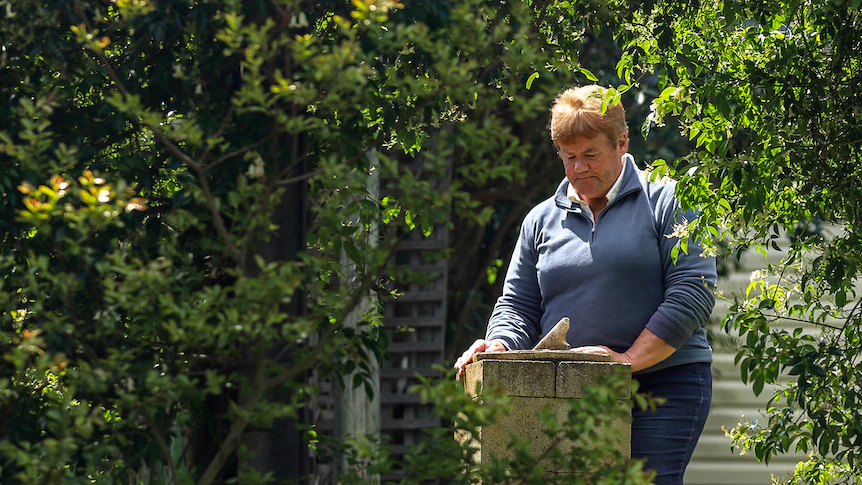Copyright abc

Since 1985, Margaret Reid has lived a kilometre or so from Winchelsea's main street, down past the paninis and coffees of the corner café, in a handsome country cottage. It's now time to move, but not to leave. Margaret couldn't imagine calling another town home, but the sprawling garden of her property in Victoria's south-west has been growing on the 71-year-old's mind. "That was what was keeping me occupied," says Margaret, who lives by herself. "When I travelled away and came home again, I'd be pulling out the weeds and I just got sick of doing that." In the midst of a nation-wide housing crisis, downsizing from her three-bedroom, 4,000-square-metre property — and potentially freeing it up for a young, tree-changing family — is just what policymakers want someone like Margaret to do. The problem is, according to housing experts, those same policymakers have done little to make that possible. "Australia has a problem with a housing mismatch," says Dr Liz Allen, demographer at the ANU Centre for Social Policy Research. "Right across the country there are folks in homes that do not meet their requirements. At the same time, there are folks in homes that are surplus to their requirements. "We have a system that locks a whole range of circumstances in place, that essentially embeds the housing mismatch and it makes it super difficult, if not impossible, to right the course." The 'missing middle' If the constellation of costs that come with downsizing — stamp duty, property listing and conveyancing fees among them — are not prohibitive, the lack of appropriate housing often proves to be. A recent report from property research firm Cotality found 61 per cent of Australian households were made up of just one or two people, but 76 per cent of Australian homes have three or more bedrooms. At the government's recent economic reform roundtable, Cotality even went as far as to float the concept of a spare bedroom tax of sorts — a suggestion met with predictable backlash. In regional and rural Australia, where more than one in three older Australians live, this "housing mismatch" forms part of a worsening shortage, according to the Regional Australia Institute (RAI). The RAI's latest housing report found 81 per cent of housing stock in regional areas was made up of detached homes. The institute heard from communities across Australia about a "missing middle" — where demand for medium-density homes, including from older people wanting to downsize and remain in their communities, is going unmet. "A lot of [older regional Australians] would gladly move if there was somewhere smaller within their community, so they can keep going to the same doctor, the same church, the same coffee shop, the same bowls club," says Victoria Cornell, a social gerontologist and research fellow at Flinders University. A 'cascading generational problem' Even for governments fixated on incentivising first-home purchases, there's an evident upside in supporting smaller and medium-scale housing geared towards older Australians. Successful examples in regional Australia, where a higher proportion of older Australians live compared to major cities, are nonetheless few and far between. "What happens when there aren't suitable homes for folks to move into? That means they can't leave to make those bigger homes available to others. "We then have a cascading generational problem that isn't caused by a single generation, but rather is a political conundrum that has essentially been fobbed off to the next mob over time within many governments." The unlikely developers Just shy of an hour and a half out of Melbourne in Winchelsea, Margaret Reid is in rare luck. A new development, years in the making, has sprouted out of the hillside in her community, mere metres from the arched bluestone bridge that connects to the town centre. Ten smaller, well appointed, energy-efficient units have just been completed, designed for the needs of local downsizers. Residents purchase a lifetime usage of their unit and get any capital gain when that usage is passed on. There's a fortnightly management fee — capped at 25 per cent of the pension — but that covers rates, water, power, building insurance and garden maintenance. The concept, execution and diffuse community benefit reads like press release heaven for any government department determined to prove it is confronting the housing crisis. Only, the development is not the work of government, but the result of thousands of hours of local community volunteer effort. "We had a couple of residents that had bigger, older houses and were needing to downsize," says Ken McDonald, one of the central volunteer committee members. "They were having to go to Geelong or Torquay to retirement villages, and the town lost valuable community contributors. That's probably what sparked the idea." The committee's vision frustratingly did not marry up with any available government grants. Instead, they leveraged decades-long local connections and muddled their way through financing and permits, with the support of a community bank and the Surf Coast Shire respectively. The development is owned by a charity created by the volunteers, with any profits going toward other community projects. There is hope it could even help finance a similar development in a nearby town. "It's repeatable in other country areas. It should be an ideal government project, they're happy to pour money into housing," Ken says. When Margaret saw the development become available, she jumped at the chance. Her handmade blankets and lifetime collection of curios now colour one of the units. Margaret's old property, a two-minute drive away, is in the final stages of being sold to a young family. "I don't think I'll miss the garden too much," she says. "This does feel like home." Across the grassed communal area and past the almost completed barbecue, soon-to-be resident Judy Cameron is already sizing up where along the fence line she will plant citrus and herbs. "I want people to be able to grab lemons as they are walking past," she beams. Judy, who volunteers as the editor of the local country newspaper, and her husband Graham, are selling their beloved five-acre family property in nearby Bambra. She has a dream buyer in mind. "My ideal person would be a young couple with the enthusiasm to build on the food-growing potential of that block." It takes Judy's new 91-year-old neighbour, Reg Stevens, a moment to calculate how long he lived at his own family farm. "Since about third-grade," he says, after a long pause. Reg was the first to purchase a unit in the new development, having sold to a farmer who bought the property for his own son. "I lost my wife and was pretty lonely out there," Reg says. "I just really don't know what I'd do if this wasn't available, you know?" Reg wonders how long he would have stayed on at the farm. Instead, he and his dog Macca can be found walking across the grounds of their new home, checking in with neighbours as they go. "It's lovely. I know everyone. It's just like home." A 'grotesque policy cock-up' In the Wimmera region, three hours north-west of Winchelsea, a rural community has turned to its local residents to help finance smaller-scale housing. With developers showing little appetite to build in the region, they have asked businesses and locals to come on board as shareholders in the construction of new houses, starting with 13 new homes in Murtoa, Donald, Minyip and Apsley. Chris Sounness, of Wimmera Southern Mallee Development, says the region's population is 10 years older than the state average and there's a need for smaller homes. "[The community] were waiting for the private sector, waiting for the government, waiting for community sector. It's just hard work in thin markets and that's what these towns are," he says. For demographer Dr Allen, communities feeling like they have to intervene in such unconventional ways to ensure residents aren't forced to leave only speaks to a broader failing. "We are seeing communities erode with time and we don't tend to have policies about ensuring social capital and social wellbeing," she says. "At the heart of social capital and social cohesion is togetherness. That can only come through community. "When we see folks being forced to leave the very source of their identity, they're leaving behind a big part of themselves and that is a grotesque policy cock-up." The unspoken 'wrench' In a housing crisis causing helplessness and too often, homelessness, the importance of being able to age in place — remaining in the community you are connected to — might seem almost quaint in the face of such urgent need. Wagga Wagga-based researcher Maree Bernoth, who has spent decades studying the significance of ageing in place, says being forced to move away has significant health and wellbeing implications and shouldn't be overlooked. "It's not just the older person who loses when they have to leave their community. It's a loss for the community as a whole," says Ms Bernoth, an adjunct associate professor at the department of rural health at Charles Sturt University. "There's someone who's no longer at bowls. There's someone who's no longer at the men's shed. There's a wrench as their community members are taken away from them." Gerontologist Victoria Cornell, who has recently returned from studying models of housing for older people overseas, believes Australia's debate is too often reductive. "The only time older people ever get talked about in terms of housing is retirement living or moving into aged care. I think it's about 8 per cent of over-65s who live in retirement villages and about 4 per cent live in residential care," she says. "In terms of genuine things that help older people move, or even recognise older people in the housing system, they are just absent." As an ageing nation, where baby boomers have become a frequent target of a cross-generational blame game, Dr Allen thinks the current housing debate — and policy approach — needs an urgent overhaul. "We've got a whole-of-system housing mismatch and at each stage of the life cycle, we have a problem. This is not just a young person problem — don't be fooled into thinking that. "We have disconnected our humanity from housing."



